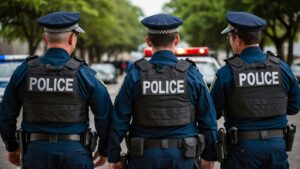Being pulled over by a police officer can trigger a wave of anxiety, causing your heart to race. You might find yourself questioning whether you’ve committed any traffic violations or if your taillights are functioning properly. In today’s climate, many Americans live in fear of police interactions, fueled by reports of misconduct and brutality.
This reality raises an important concern: what should you do if you believe your civil rights have been violated during a police stop? Understanding how to navigate this situation and knowing your options for legal recourse is crucial in protecting your rights.
What Are My Civil Rights?
In the United States, every individual is guaranteed equal treatment under the law, a fundamental principle enshrined in the Constitution. This legal framework safeguards the civil liberties of all citizens, ensuring their freedom from violations.
However, discrimination remains one of the most pressing civil rights issues in today’s world. It undermines the very fabric of our society, as individuals are often treated unequally based on inherent traits that define their identity. Regardless of race or skin color, national origin, disability, age, religion, sexuality, or gender, everyone deserves equitable treatment and protection from discriminatory actions, especially those enforced by governmental entities. Addressing discrimination is crucial for fostering a just society where all individuals can thrive without fear of bias or injustice. So, how can a police officer violate your civil rights?
Police Officers & Civil Rights

Civil rights violations by police officers manifest in several significant ways. Here are some common issues:
- Police Shootings
Thousands of individuals are shot or killed by police each year, with African Americans facing a rate more than twice as high as Caucasian Americans. If you or a loved one has been injured in a wrongful police shooting, seeking justice is essential.
- Wrongful Search and Seizure
Policies like the NYPD’s Stop-and-Frisk allowed unwarranted stops and searches, disproportionately affecting minority communities. The Fourth Amendment protects against these violations, and victims have the right to seek justice for unlawful searches.
- Unlawful Arrests
Police cannot arrest individuals without legal grounds, yet unlawful arrests occur due to profiling or misuse of power. If you or a loved one has faced an unjust arrest, it’s important to reclaim your rights.
- Wrongful Conviction
An estimated 2% to 10% of individuals in U.S. prisons are likely innocent. Wrongful convictions can devastate lives, and fighting back is critical to uphold your rights.
- Police Brutality
Despite their authority, police officers are not above the law. With the rise of body cameras and smartphones, holding officers accountable for brutality is more accessible than ever.
- Excessive Force
Excessive force during stops or detentions is a serious violation of rights. Officers must be held accountable for any unnecessary violence or harm inflicted.
Addressing these violations is vital for ensuring equality and justice for all individuals in society. Have your rights been violated by a police officer? What should you do next?
How Do I Sue the Police for Violating Civil Rights
When it comes to navigating a pain and suffering claim or suing a police officer for civil rights violations, doing so without a skilled lawyer can be nearly impossible. A competent civil rights attorney will help ensure you don’t fall victim to these strategies and will fight for the maximum compensation you deserve. Remember, asserting your rights is essential, but having the right legal representation is crucial for success. So how should you proceed?
- Consulting an experienced civil rights attorney is crucial after an incident. They can assess your case and provide guidance on the best steps to take.
- Gather and preserve evidence, such as photos, videos, witness statements, and records related to the incident. Document the names and badge numbers of the involved officers for reference.
- Before filing a lawsuit, you must submit a complaint to the appropriate agency, like the police department’s internal affairs. If the complaint doesn’t resolve the issue, you can proceed with a lawsuit against the officer with your attorney’s assistance.
- You will need to attend court proceedings, where your attorney will handle most legal matters. If successful, you may receive compensation for damages like medical expenses and emotional distress.
To win a civil rights claim, you must show that the officer’s actions violated established police practices and caused you harm, rather than just proving unfair treatment.
Defending Your Rights With Kirakosian Law
We are committed to standing up to government entities when there is clear evidence of misconduct by civic leaders or law enforcement officers. Our firm is not afraid to take cases to federal court when necessary.
When a fair settlement cannot be reached through mediation, we are fully prepared to take civil cases to trial. In fact, Mr. Kirakosian achieved a significant victory in Los Angeles Federal Court, securing a substantial verdict for a man who sued the Los Angeles Police Department for violating his constitutional rights and for malicious prosecution by an on-duty LAPD detective.
If you or someone you know has suffered emotional distress or injury due to a civil rights violation, contact our attorney at Kirakosian Law APC for a free consultation.
